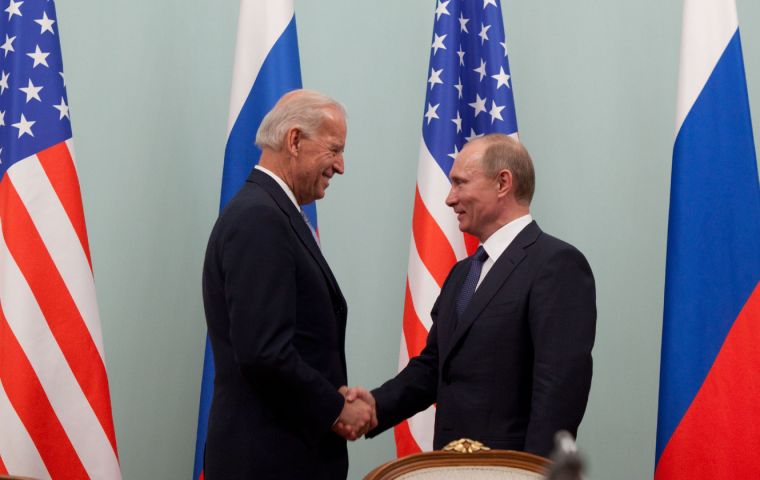MercoPress. South Atlantic News Agency
Biden warns Putin, renews US-NATO partnership after somber Trump years
 Europe knows “the United States is there,” Biden said
Europe knows “the United States is there,” Biden said United States President Joseph Biden Monday called on his Russian colleague Vladimir Putin to step back from provocative actions during a news conference at the NATO headquarters in Brussels.
With his presence at the Summit, Biden renewed his country's commitment to the 30-nation alliance, neglected during the four years of the Donald Trump administration. “I just want all of Europe to know that the United States is there,” Biden said. “The United States is there.”
The US leader is to meet with Putin Wednesday in Geneva. “I’m going to make clear to President Putin that there are areas where we can cooperate if he chooses.” But “if he chooses not to cooperate and acts in a way that he has in the past relative to cybersecurity and other activities, then we will respond, we will respond in kind.”
The issue of China was also discussed at the NATO summit. NATO leaders declared China a constant security challenge and said the Chinese are working to undermine global order, a message which was aligned with Biden’s plans to confront Beijing on trade, military and human rights practices. The NATO leaders said in a statement that China’s goals and “assertive behaviour present systemic challenges to the rules-based international order and areas relevant to alliance security.” They also expressed concern about what they said were China's “coercive policies,” the opaque ways it is modernizing its armed forces and its use of disinformation.
The NATO declaration also addressed Russia's aggressive military activities and its snap wargames near the alliance's borders as well as repeated violations of their airspace by Russian aircraft. Russia was also said to have ramped up “hybrid” actions against member countries by attempts to interfere in elections, by political and economic intimidation, by disinformation campaigns and “malicious cyber activities” and no return to business as usual could be achieved “until Russia demonstrates compliance with international law and its international obligations and responsibilities.”
The North Atlantic Treaty Organization is an alliance of European and North American countries formed after World War II as a bulwark against Soviet aggression. The new Brussels communique states plainly that the NATO nations “will engage China with a view to defending the security interests of the alliance.”
Biden arrived at the NATO summit after three days of consulting with Group of Seven allies in England, where he successfully pushed for a G-7 declaration that called out forced labour practices and other human rights violations impacting Uyghur Muslims and other ethnic minorities in China's western Xinjiang province.
German Chancellor Angela Merkel said NATO’s decision to name China as a threat “shouldn’t be overstated” because Beijing, like Russia, is also a partner in some areas. China is Germany's top trading partner, and she said it is important to “find the right balance.”
NATO Secretary-General Jens Stoltenberg said the meeting comes “at a pivotal time” for NATO, and previewed discussions on the threats both Russia and China pose. “I think that the Allied leaders look forward to consulting with you ahead of the meeting with President Putin,“ Stoltenberg said, referring to Biden’s meeting on June 16 with Russian President Vladimir Putin in Geneva, while adding that allies would also address China. “We all recognize that China’s heavy investments in military capabilities, continued coercive behaviour, and their growing influence matters for our security,” Stoltenberg said. “And we need to respond to that as an Alliance.”
“A strong NATO is good for Europe, but it is also good for America,” Stoltenberg added. Biden agreed: “It’s very good for America; it’s essential for America.”
France's President Emmanuel Macron urged the alliance not to let China distract it from what he saw as more pressing issues facing NATO, including the fight against terrorism and security issues related to Russia. “I think it is very important not to scatter our efforts and not to have biases in our relation to China,” Macron said.
The Chinese Embassy to the United Kingdom on Monday issued a statement saying the G-7 communique “deliberately slandered China and arbitrarily interfered in China’s internal affairs.” There was no immediate reaction from the Chinese government to the new NATO statement.
Belgian Prime Minister Alexander de Croo said Biden’s presence “emphasizes the renewal of the transatlantic partnership.“ De Croo said NATO allies were looking to get beyond four stormy years with Trump and infighting among member countries. “I think now we are ready to turn the page,” De Croo said.
The organization declared in 2014 that a cyber attack could be met by a collective response by all 30 member countries, and on Monday they said that “the impact of significant malicious cumulative cyber activities might, in certain circumstances, be considered as amounting to an armed attack.”
Biden also met with Turkey's President Recep Tayyip Erdogan, on the summit sidelines. Biden has known Erdogan for years, but their relationship has frequently been contentious. Biden, during his campaign, drew ire from Turkish officials when he described Erdogan as an “autocrat.“ In April, Biden infuriated Ankara by declaring that the Ottoman-era mass killing and deportations of Armenians was “genocide” — a term that US presidents have avoided using.




Top Comments
Disclaimer & comment rulesCommenting for this story is now closed.
If you have a Facebook account, become a fan and comment on our Facebook Page!